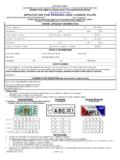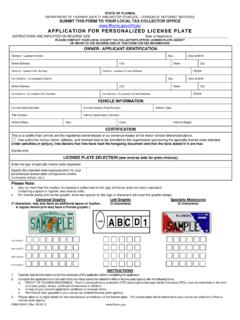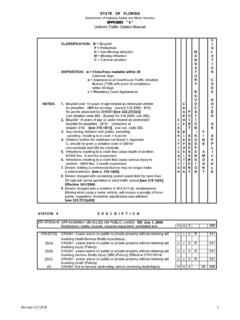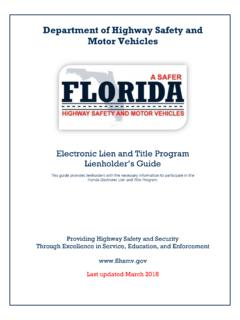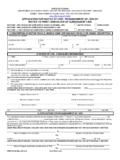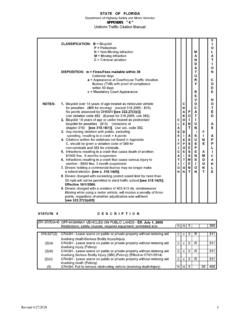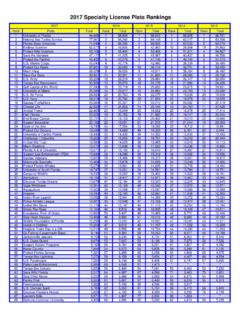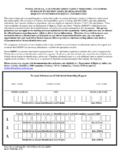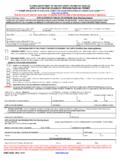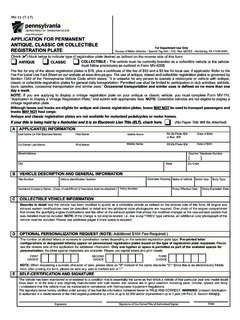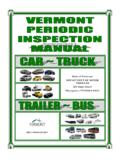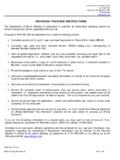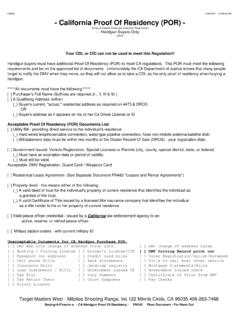Transcription of Buying a car is one of the most important and most ...
1 2 Buying a car is one of the most important and most expensive decisions most of us have to make. There is certainly no shortage of vehicles avail-able, but buyers must know what to look for, what to ask and what rights they have. New CarsBuying from a Licensed DealerWhen you buy from a licensed Florida dealer, Florida s motor vehicle laws protect you. Dealers must follow the laws when they advertise, display and sell vehicles. When a licensed dealer places an ad, the advertisement must disclose all charges you are expected to pay, except sales tax, tag and title fees, which the dealer must collect up front from the purchaser. Florida law requires the dealer to apply for title and registration in the name of the purchaser within 30 calendar days from date of Vehicle WarrantyNew cars carry a manufacturer s warranty, which will vary in months and/or miles.
2 Some dealers offer extended warranties. The manufacturer or insurance company will sell the warranties. The Florida Department of Finan-cial Services regulates warranties that insurance companies offer. Tires, battery and dealer-installed options may have separate warranties that differ in time and mileage. Read all warranties to find out what it covers, for how long, who will honor the warranty and what you must do to keep it in s New Car Lemon Law Florida s Lemon Law applies to new or demonstra-tor motor vehicles or new or demonstrator recre-ational vehicles sold or long-term leased in the state. When consumers buy or lease a new or demonstrator motor vehicle, they must receive from the selling dealer or lessor the Consumer Guide to the Florida Lemon Law. The publication explains consumer rights, gives steps to follow to resolve problems and contains a toll-free number for the Lemon Law Hotline and a form the consumer can use to notify the manufacture of chronic defect and time out of service repair.
3 To obtain a Consumer Guide to the Florida Lemon Law, or to speak with someone about the Lemon Law, consumers in Florida may call the Lemon Law Hotline at (800) 321-5366 or (850) 488-2221 for consumers outside of Florida between the hours of 8:30 to 4:30 (Eastern Time). Click here for more CarsThere is no Lemon Law for used cars in Florida. With the average price of a new car increasing every year, it is not surprising that the fastest growing segment of the auto industry is the used car market. Buying a car that is just a year or two old can save thousands of dollars over the price of a new model, especially as the prices of new cars increase. The biggest advice is to Do Your Homework. Motor vehicle laws and warranties differ for used cars. Many reputable dealers sell used cars and will give you an honest deal. However, buyers do not have the same protections as they do for new cars under the motor vehicle laws of Florida.
4 Where to BuyA used vehicle is a major purchase and requires comparison shopping for price and value to find the best deal. Many sources are available for today s purchaser: new car dealers used car dealers rental car companies leasing companies private individuals Car DealersNew car dealers generally keep only the best cars and usually inspect them thor-oughly. Consider Buying from a dealer who handles the particular brand of vehicle that you are interested in Buying . Look for a full service department and a well-stocked supply of parts. Dealers may offer a parts and labor warranty. Be sure to visit several automobile dealerships. AS-IS or WarrantyFederal law requires all dealers to post a buyers guide in the window of each vehicle they offer for sale. The buyers guide notifies the buyer that there is a warranty or that the vehicle is being sold AS-IS with no warranty of any kind.
5 In the case of an AS-IS sale, once you drive the vehicle from the dealership, it be-longs to you despite any problems the vehicle may have. If the vehicle breaks down after only a few minutes of leaving the dealership, the repairs are YOUR responsi-bility. Sometimes the most important difference between vehicles is not under the hood 4or in the extra equipment offered, but rather it is tucked away in the product pack-aging - the warranty card. While you may think nothing will ever happen to your newly purchased vehicle, problems will surface. The better the warranty, the less you will pay for those unexpected repair bills. When comparing warranty policies, longer is better. However, be cautious of poli-cies that are too long or have unrealistic requirements -- the company may not be around later when the vehicle needs service.
6 Be sure to ask: Are all the parts covered? Is there a co-payment? Am I required to have repairs done only at selected garages? Must I account for normal service? Can I choose the repair shop, or does the policy designate specific certified repairshops? ( important if you live some distance from where you expect to take your vehicle for repairs and services.) If misused, is the warranty completely void on all covered items? Keep your warranty safe. A good place to keep it is with receipts. Make a copy, and keep it in a separate location. Some companies are lax, while others require you to have the original warranty with you when they perform repairs. Be sure to be specific in following the manufacturer s warranty requirements. The Magnuson-Moss Warranty Act of 1975 requires that warranties be available for reading before purchase.
7 Unfortunately, some companies do not comply with the requirement. No reputable dealer runs afoul of this law, but their administrative procedures for providing the information are sometimes incomplete. Under the federal law, you can sue based on breach of express warranties, implied warranties or a service contract. The bottom line is that you should read warranties carefully, especially the fine print. Be sure to obtain copies of the documents you sign. Be sure that any other papers you sign match what you agreed to. Remember, there is no warranty or agreement unless it is in writing and signed by all parties. Get in writing any promises made. 5 Private IndividualsPrivate individuals are another source to consider when purchasing a used vehicle. Keep in mind that a private party may not necessarily offer a better deal.
8 One ben-efit is that the potential buyer can meet the seller face to face and inquire about any mechanical problems, the principal driver, why the owner is selling the vehicle and maintenance records. When purchasing a vehicle from a private individual, there are no warranties of any kind. It is strictly buyer beware. In addition, the buyers will have to provide their own financing for the vehicle or pay cash. When Buying a used motor vehicle from anyone other than a licensed reputable dealer, be cautious. Check the vehicle identification number (VIN) to ensure it appears the same on the title certificate as it does on the vehicle. Visit and verify the vehicle information with the VIN number. Check the vehicle s doors and ignition locks to ensure they have not been tam-pered. Check windows for signs of break-ins, such as tool marks, chipped glass, windows that do not properly close or have the original glass.
9 Check windows for an etched VIN, which should match the public VIN. Verify the seller s telephone number. Unlisted numbers or pager numbers are dif-ficult to trace should problems arise with the vehicle. Determine why the owner is selling the vehicle. Pay attention to the seller s rea-son for selling. Inconsistencies can indicate illegal sales. Check the vehicle s title certificate for evidence of erasures or other signs of tam-pering. Is the vehicle titled in the seller s name? Verify the seller s information on their driver license to ensure it matches the name on the title certificate. Do the signatures match? Have the vehicle inspected by a reputable mechanic. Remember, an advertised price will not include sales tax or tag and title fees. Ex-pect to pay the fees to the county tax collector s office when you transfer HAVE DECIDED ON A CAR NOW WHAT?
10 You Sign, You Buy The ContractDealers use a purchase contract form when selling vehicles. Read and understand the contract before you sign. Once you and dealer sign the offer, it becomes a bind-ing contract. The dealer cannot raise the price or sell the vehicle to anyone else. You cannot cancel the contract should include the following information about your purchase: Whether you are Buying the car with a warranty or AS-IS. Date your vehicle will be delivered. Other conditions of sale Get all promises in writing on the contract. Itemized list of costs including tax, title and registration fees. Note: Administrative fees, courier fees, processing fees, handling fees and get-ready fees, often charged by dealers and printed on the buyer s order are not official fees. They are a profit for the dealer and are negotiable.
